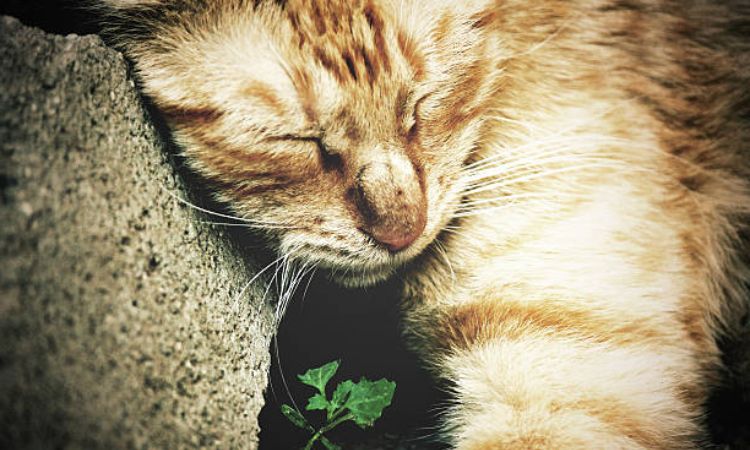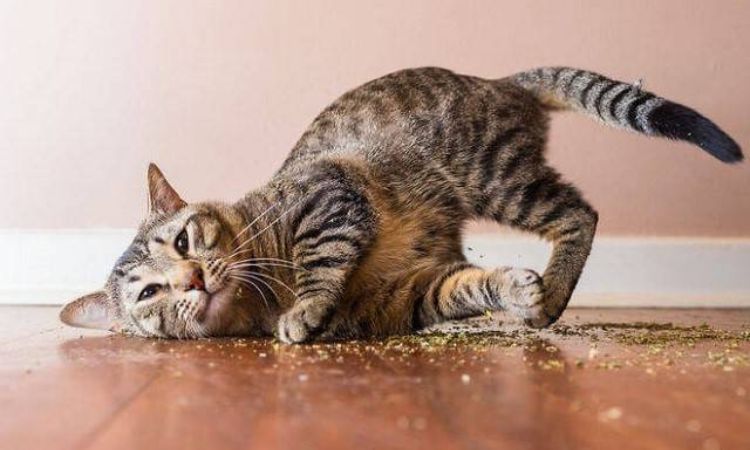After a long day, there’s nothing quite like sinking into bed, only to realize your cat is wide awake and ready to party. Many pet parents eventually wonder if catnip, that mysterious little herb that sends some cats into playful frenzies and others into dreamy bliss, could be the secret to a good night’s rest. In this article, Nexus-Pets takes a closer look at whether catnip can really help your feline wind down and sleep through the night.

What is Catnip and How Does it Affect Cats?
Catnip, scientifically known as Nepeta cataria, is a member of the mint family that has fascinated cats for generations. Its key active compound, nepetalactone, is found in the plant’s leaves and stems and is responsible for the unique effects it produces in felines. When a cat inhales nepetalactone, the compound binds to receptors in the nose, which in turn stimulates specific areas of the brain that regulate mood and behavior. This stimulation can trigger a temporary sense of euphoria, excitement, or even mild hallucinatory effects, though cats remain fully aware of their surroundings.
Cats respond to catnip in various ways, and individual reactions can differ widely:
- Excitement and playfulness: Many cats become energetic, running, jumping, rolling, and engaging enthusiastically with toys or objects in their environment.
- Relaxation and drowsiness: Some cats, particularly when they eat catnip rather than just sniff it, may become calm, mellow, and even sleepy.
- Individual variation: Sensitivity to catnip is inherited, so not all cats are affected. About 50–75% of cats show a reaction, while the rest remain indifferent. Kittens under six months and older senior cats are less likely to respond.
Overall, catnip is safe, non-addictive, and can be a valuable tool for encouraging both play and relaxation, depending on your cat’s unique personality.
Does Catnip Help a Cat Sleep at Night?
The answer depends on your cat. Catnip can affect cats in different ways—some become stimulated and playful, while others experience relaxation and drowsiness. Whether it can help your cat sleep at night largely hinges on how your individual cat reacts.
- Using Catnip as a Sedative: For cats that respond with calmness and drowsiness, a small amount of edible catnip can be a helpful tool to ease them into a restful state before bedtime. Eating catnip releases nepetalactone, the compound responsible for its calming effect, encouraging your cat to settle down and relax.
- Tiring Them Out: For cats that become hyperactive from catnip, this stimulation isn’t wasted. An evening play session—perhaps with interactive toys or a cat wand—can help your cat burn off excess energy. This way, even a hyperactive cat is more likely to sleep soundly once their playtime is over.

Best Practices for Using Catnip to Promote Sleep
Using catnip effectively can help your cat relax or burn off excess energy, improving their nighttime sleep. Here’s how to do it safely and successfully:
- 1. Time It Right: Offer catnip in the early evening. A small edible dose can help your cat relax, or a catnip-fueled play session can help them expend energy before bedtime. Aligning catnip use with your cat’s natural activity schedule increases the chances of a restful night.
- 2. Use in Moderation: Catnip is most effective when given sparingly. Frequent exposure can lead to desensitization, making it less effective over time. A typical catnip session lasts 5–15 minutes, followed by a cooldown period. Limit use to a few times per week to maintain its impact.
- 3. Supervise Consumption: While generally safe, too much catnip can cause mild stomach upset, including vomiting or diarrhea. Monitor your cat to ensure they don’t overindulge.
- 4. Explore Alternatives: Some cats don’t respond to catnip due to genetics. If your cat is unresponsive, alternatives like silvervine or valerian root can provide similar calming or stimulating effects.
These practices help you use catnip as a tool to support your cat’s sleep while keeping them happy and healthy.
Whether catnip helps your cat sleep ultimately comes down to your individual cat’s reaction. For some felines, it acts as a calming agent that promotes a relaxed, sleepy state. For others, it’s a stimulant that can lead to a burst of playful energy. By observing your own cat, you’ll know if catnip is a tool for winding them down or simply a way to tire them out before bed.






